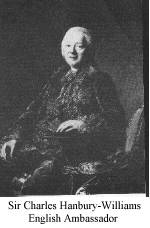




The young couple settled down, but the marriage was a miserable failure. Princess Johanna had returned to Zerbst. Catherine occupied herself with reading everything she could lay her hands on. She discovered satisfaction, as she moved from the works of Plato to the works of Voltaire. Her interest in the intellect caused an even greater estrangement between herself and Peter, who began to avoid her. He took pleasure in telling her how much he admired other women. Catherine started to feel contempt for his childish occupations. The years passed and no heir was in sight. This of course irritated the Empress, who by now thought it must be Catherine's fault, if she cannot make herself attractive to her husband. She also ordered physical examinations by a Physician.  It was discovered that a small surgical intervention would enable Peter to have normal marital relations. This done, Catherine finally, on September 20, 1754, gave birth to a son, whom the Empress named Paul. Elizabeth carried the baby off to her apartments. There he would remain, as long as the Empress lived. After the birth of her son, whom she was not allowed to see for months, and then only after confronting the Empress, a change came over Catherine. She trusted no one. She did help Peter with his Holstein Affairs and, at the same time, befriended the British Ambassador, Sir Charles Hanbury-Williams. Sir Charles arranged secret "loans" for her from England, as she was always short of
funds.
It was discovered that a small surgical intervention would enable Peter to have normal marital relations. This done, Catherine finally, on September 20, 1754, gave birth to a son, whom the Empress named Paul. Elizabeth carried the baby off to her apartments. There he would remain, as long as the Empress lived. After the birth of her son, whom she was not allowed to see for months, and then only after confronting the Empress, a change came over Catherine. She trusted no one. She did help Peter with his Holstein Affairs and, at the same time, befriended the British Ambassador, Sir Charles Hanbury-Williams. Sir Charles arranged secret "loans" for her from England, as she was always short of
funds.
The Seven Year War put an end to this friendship. England was on Prussia's side against Russia, and the English Ambassador was called home to London. Peter was devastated because he could not envision a War against his idol King Frederick. During the War, Count Schwerin, an aide-de-camp to the King of Prussia was brought to St. Petersburg as a Prisoner of War. Two Russian officers accompanied this celebrated prisoner, who was installed in a house not far from the Imperial Palace. One of these Russian officers was a young lieutenant, Gregory Orlov, who had been the hero at the battle of Zorndorf. There were five Orlov brothers, all officers in the Imperial Guard. Of the five Gregory was certainly the most charming. They were not of high birth, but to Catherine they were the embodiment of the Russian Army and, as a result, Catherine fell in love with Gregory. Peter had formed a close relationship with Elizabeth Vorontsova,
the niece of the Vice-Chancellor. She was Peter's mistress for all to see. It is possible that Peter felt superior to this lady, who was homely and had very crude manners.




 It was discovered that a small surgical intervention would enable Peter to have normal marital relations. This done, Catherine finally, on September 20, 1754, gave birth to a son, whom the Empress named Paul. Elizabeth carried the baby off to her apartments. There he would remain, as long as the Empress lived. After the birth of her son, whom she was not allowed to see for months, and then only after confronting the Empress, a change came over Catherine. She trusted no one. She did help Peter with his Holstein Affairs and, at the same time, befriended the British Ambassador, Sir Charles Hanbury-Williams. Sir Charles arranged secret "loans" for her from England, as she was always short of
funds.
It was discovered that a small surgical intervention would enable Peter to have normal marital relations. This done, Catherine finally, on September 20, 1754, gave birth to a son, whom the Empress named Paul. Elizabeth carried the baby off to her apartments. There he would remain, as long as the Empress lived. After the birth of her son, whom she was not allowed to see for months, and then only after confronting the Empress, a change came over Catherine. She trusted no one. She did help Peter with his Holstein Affairs and, at the same time, befriended the British Ambassador, Sir Charles Hanbury-Williams. Sir Charles arranged secret "loans" for her from England, as she was always short of
funds.
